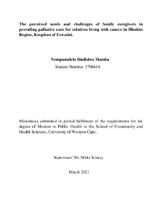| dc.contributor.advisor | Schaay, Nikki | |
| dc.contributor.author | Mamba, Nompumelelo Sindisiwe | |
| dc.date.accessioned | 2021-03-30T07:51:17Z | |
| dc.date.available | 2021-03-30T07:51:17Z | |
| dc.date.issued | 2021 | |
| dc.identifier.uri | http://hdl.handle.net/11394/8088 | |
| dc.description | Master of Public Health - MPH | en_US |
| dc.description.abstract | In 2018 within the Kingdom of Eswatini, there were an estimated 1 074 new cancer cases and 660 cancer-related deaths. For some time, there has been a growing trend away from the provision of palliative care within an institutional setting to providing palliative care to the patient within the context of their own home. As a result, the majority of dying patients spend their final days at home with much of the care being provided by family caregivers. In Eswatini, little is known about the impact that managing a terminally ill patient has on the family caregiver and whether they experience receiving sufficient support from the local health services. This study aimed to explore the needs and challenges of family caregivers in providing palliative care for their relatives living with cancer in Hhohho Region, Kingdom of Eswatini. | en_US |
| dc.language.iso | en | en_US |
| dc.publisher | University of the Western Cape | en_US |
| dc.subject | Palliative care | en_US |
| dc.subject | Home-based care | en_US |
| dc.subject | Family | en_US |
| dc.subject | Cancer | en_US |
| dc.subject | Support | en_US |
| dc.subject | Eswatini | en_US |
| dc.title | The perceived needs and challenges of family caregivers in providing palliative care for relatives living with cancer in Hhohho Region, Kingdom of Eswatini. | en_US |
| dc.rights.holder | University of the Western Cape | en_US |

